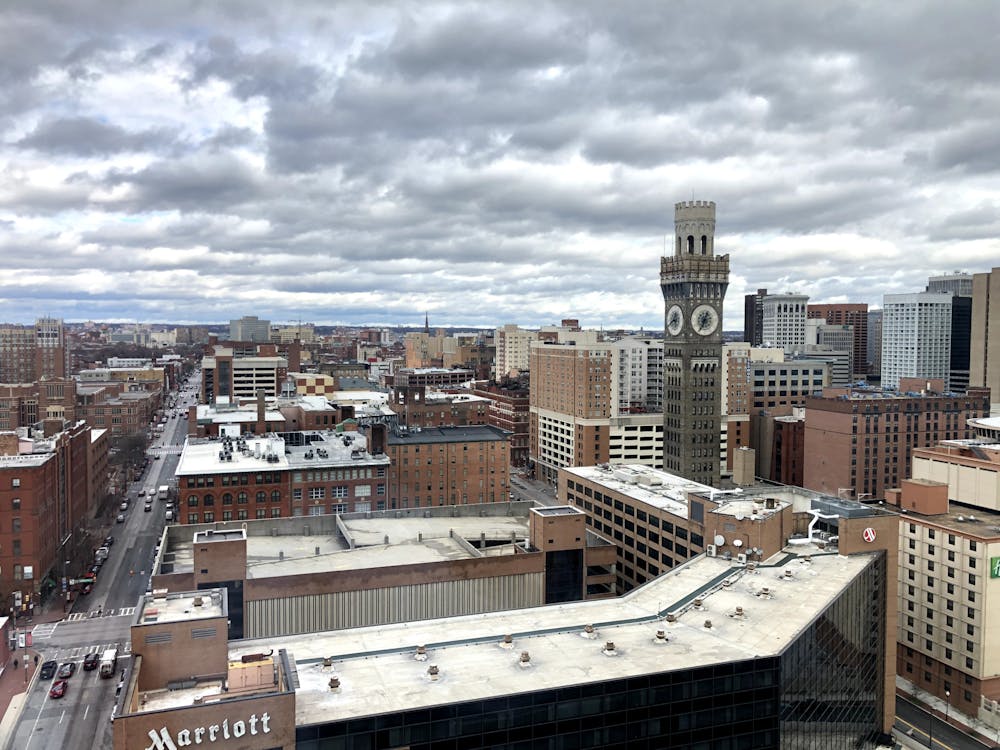Baltimore Mayor Brandon Scott announced new restrictions to contain the spread of COVID-19 in the city earlier today. Both indoor and outdoor dining will be prohibited. Outdoor gatherings in public and private facilities will be limited to 25 people, while all indoor gatherings will be capped at 10 people.
Religious and retail facilities, gyms, museums and casinos will be open for 25% of maximum occupancy. The restrictions will go into effect at 5 p.m. on Friday, Dec. 11.
Restaurants will be able to continue offering carry-out, delivery and drive-through service.
In a press conference announcing the restrictions, Scott addressed the rising number of COVID-19 cases. Maryland reported 2,632 new cases on Tuesday, and 50 deaths were related to the virus, the highest daily number of deaths reported during the pandemic.
“This is about saving lives — nothing more and nothing less,” Scott said. “COVID doesn’t get tired, COVID doesn’t take days off and COVID doesn’t care how you want to go back to normal. It is actively looking to infect us all. We need all residents and businesses to act accordingly.”
This announcement came a day after Scott was sworn into office as Baltimore’s 52nd mayor. In his inaugural address, he pledged to prioritize keeping Baltimore residents safe from COVID-19 and ensuring access to testing and, once available, a vaccine.
Scott’s predecessor Bernard C. “Jack” Young had resisted statewide moves to further reopen the city. Most recently, when Governor Larry Hogan announced that Maryland was entering stage three of the state’s Roadmap to Recovery plan, Young declined to move past the first stage.
Sophomore Isabel Veloso, a Baltimore resident, is not surprised by the new restrictions. In an interview with The News-Letter, she expressed hope that Scott and Baltimore City Commissioner of Health Letitia Dzirasa will implement effective mitigation measures to curtail the spread of the virus.
“It’s definitely the right thing to do,” she said. “The city has done relatively well, but we could be doing better. Hopefully Mayor Scott and Dr. Dzirasa will be able to make some good changes.”
Senior Jack O’Donnell, who has spent the fall semester in off-campus housing, feels that changing guidelines are necessary.
“It’s pretty shocking to see the rates of increase, so I understand where the government is coming from,” he said. “One of the important elements of effective government policy is adaptability to changing circumstances. While I understand it can be frustrating in day-to-day lives, I think that this is for the greater good.”
Junior Elisa Herrera noted how going out to eat has been a way for many undergraduates to socialize without breaking city or University guidelines.
Considering what she sees as increased indoor and outdoor dining, Herrera believes that the restrictions are likely to help reduce spiking cases. She also argued that monitoring and responding to changes in case numbers is an effective strategy.
“People have done a good job of following the rules, but there is not really anything to do,” Herrera said. “People have been bored and going out to eat more than they might otherwise — not that there’s anything wrong with that, but it could be contributing to spiking numbers.”
Spring reopening plans
On Dec. 8, Stephen Gange, executive vice provost for academic affairs, and Jane Schlegel, vice president and chief administrative officer, announced in a University-wide email that Hopkins is continuing to plan for increased in-person activities on campus this spring.
With rising COVID-19 cases and restrictions aiming to shut down many high-risk activities, however, there are added challenges for the University to implement the draft hybrid plan for the spring semester. According to Gange and Schlegel, there have been significant increases in COVID-19 cases among University affiliates.
Veloso expressed concern about whether returning Hopkins students could worsen the situation in Baltimore.
“Can we trust Hopkins students enough to come back and not spread it?” she said. “Many of us live in Charles Village. You have to go to Giant to get your groceries and stuff like that. It would be a lot harder for us to safely live our lives in Baltimore, and that’s what’s worrying.”
Herrera, however, believes the new restrictions could increase the chances of students being welcomed back to campus.
“Hopefully, these restrictions will have a positive impact on our ability to come back in the spring by controlling the spread of the virus,” she said.





